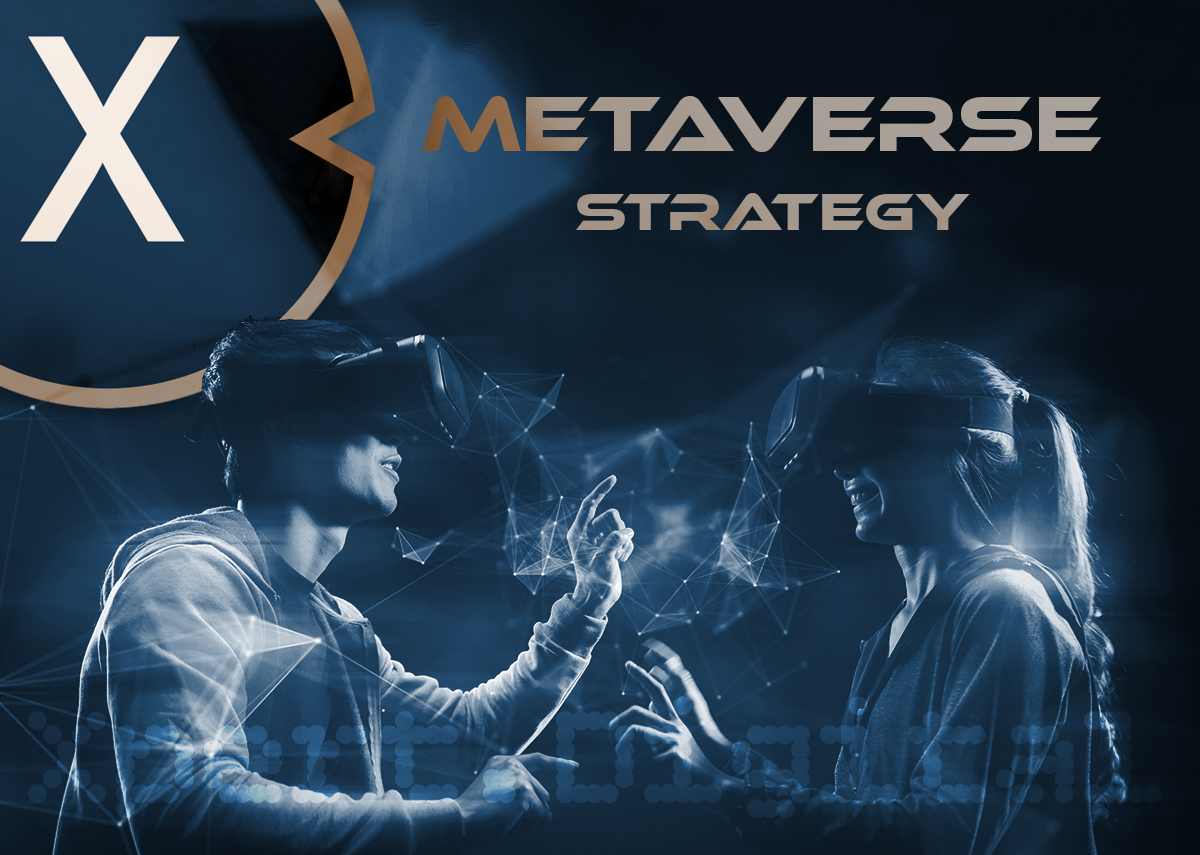The Center for European Politics (cep) is critical of the EU Commission's Metaverse strategy - not competitive
Language selection 📢
Published on: October 24, 2023 / update from: October 24, 2023 - Author: Konrad Wolfenstein

The Center for European Politics (cep) is critical of the EU Commission's Metaverse strategy - Image: Xpert.Digital
🌐 Metaverse: cep criticizes commission strategy as not competitive
“There are no clear ideas on how Europe should gain influence on the design of Metaverse standards and can remain confident. The existing concentration on US companies gives rise to concern for the competitiveness of the EU. ”
📚 The Metaverse: A critical analysis of the European Commission's Metaverse strategy
In recent years, the concept of the Metaverse has emerged as one of the most exciting and promising trends in the technology industry. Virtual worlds where people can interact with each other, create jobs and open up new business opportunities have attracted interest from companies and governments around the world. In this context, the European Commission has developed a metaverse strategy, but it has met with criticism.
🔍 The Metaverse Strategy Debate
The European Commission and the Center for European Politics (cep), a policy think tank, are engaged in a debate over the effectiveness and competitiveness of the proposed Metaverse strategy. While the Commission aims to promote the growth and use of virtual worlds in Europe, cep experts have raised concerns.
❓ Criticisms and challenges
A central concern of cep is the lack of clarity and precision in the formulation of the measures. The strategy is misleading and leaves room for interpretations that could lead to misunderstandings and uncertainty. This is an important point as clear guidelines for the development of the metaverse are crucial to ensure an efficient and fair design.
🌐 The role of the EU in the global Metaverse market
Another aspect that is criticized is the focus on US tech giants like Meta. The European Union has the potential to play a strong and independent role in the Metaverse space. Nevertheless, the proposed strategy does not appear to strengthen the EU sufficiently in terms of standards and innovation to compete with US companies. This raises questions about the EU's long-term competitiveness in the global Metaverse market.
👨💼 Expert opinions
Anselm Küsters, a digital expert at cep, emphasizes the need for clear ideas on how Europe can influence the design of Metaverse standards. He points out that the EU must ensure that it remains sovereign and is not dominated by foreign tech giants. This requires a strategic approach that puts European values, security and the protection of human rights at the forefront.
🎓 Skill development in the metaverse
The cep researchers also highlight the question of skills development. The strategy seems vague when it comes to how Europe can attract and retain qualified professionals in the metaverse space. This is crucial because the development of innovative European companies depends on a highly qualified workforce. Close cooperation between the EU and its Member States on training and talent development could be a solution.
📈 Competition policy and financing
Another point that is not adequately addressed in the Metaverse strategy concerns competition policy. While promoting innovation and growth is important, this cannot come at the expense of fair competition. The strategy should provide clear rules and regulations for the Metaverse market to prevent monopolies and unfair competitive practices.
In addition, financial aspects are a decisive factor. The issue of funding and investment in the Metaverse is not adequately addressed in the strategy. It is important to create mechanisms that make it easier for European companies to access capital while ensuring that public money is used wisely.
⚖️ Legal aspects and consumer protection
An important legal aspect addressed by cep consumer expert Patrick Stockebrandt concerns the enforcement of existing regulations in the metaverse. It is crucial to ensure that the rights of users and consumers are protected. This requires global standards and the effective implementation of existing laws and regulations in virtual space.
🌍 cep's criticism of the European Commission's Metaverse strategy
Overall, cep's criticism of the European Commission's Metaverse strategy highlights the complexity and challenges associated with the design and regulation of the Metaverse. It is crucial that the EU develops a clear and comprehensive strategy that takes into account both the interests of citizens and the competitiveness of European companies.
Digitalization and the development of the metaverse are unstoppable trends that will have a significant impact on our society and economy. It is the responsibility of the European Commission and Member States to ensure that Europe plays a leading role in this digital revolution and makes the most of the opportunities presented by the Metaverse.
It remains to be seen how the debate about the EU's Metaverse strategy will continue and what concrete measures will be taken to realize the vision of the Metaverse as a driver for growth and innovation in Europe. An open and transparent discussion with experts and stakeholders is crucial to finding the best solutions to the challenges of the Metaverse.
📣 Similar topics
- The future of the Metaverse in Europe 🌐
- Criticism and Opportunities: The EU's Metaverse Strategy 🇪🇺
- Metaverse Regulation: A Look at the Challenges 📜
- Europe vs. USA: Metaverse competition in focus 🤝
- Metaverse standards and EU sovereignty 🌟
- Skills development in the metaverse: Europe's way 🚀
- Fair Competition in the Metaverse: Necessary Regulations 🏁
- Financing in the Metaverse: Access to Capital for Companies 💰
- Law Enforcement in the Metaverse: Protecting User Rights ⚖️
- The complex future of the Metaverse in Europe 🌐🇪🇺
#️⃣ Hashtags: #Metaverse #EU #Regulation #Innovation #Competition
🌐 The Center for European Politics (cep)
The Center for European Politics (cep) is a European policy think tank that is part of the Regulatory Policy Foundation. The cep is based in Freiburg and analyzes economically relevant projects as well as European policy issues. As an independent center of excellence, it conducts research and analysis to inform and advise policymakers, businesses and the public on European affairs.
The cep works to create a better understanding of European political, economic and social developments. It deals with topics such as EU law, economic policy, financial market regulation, social and economic issues and international relations. Its main aim is to provide evidence-based and well-founded analyzes to promote discussion about European policy.
The cep also works with other organizations, think tanks and research institutions to further advance European integration and cooperation. It is an important player in the European political landscape and plays a significant role in the development and implementation of European policies.
The organization has partner organizations and branches in various European cities, including Paris and Berlin, highlighting its cross-border collaboration and role as an influential think tank in Europe.
🌐 Key differences in Metaverse development in Asia and the West – Metaverse approach, boom, dynamics and innovations
In Asia, especially in countries like South Korea, China and Japan, the Metaverse is primarily embraced and driven by the younger generation. Teenagers and young adults are spending more and more time in virtual spaces, be it to play, communicate or shop. Asia is home to 60 percent of the global youth population, and this number is reflected in the tremendous activity and engagement in the Metaverse.
In contrast, the West, particularly countries like Germany, has taken a slightly different approach to integrating the Metaverse. Instead of focusing exclusively on social and entertainment aspects, the focus here is on the use of the Metaverse in the industrial sector. The German Industry 4.0 concept, which includes automation and data networking in manufacturing technology, will be merged with the Metaverse. This leads to the emergence of the so-called “Industrial Metaverse”.
More about it here:
📖 The cep analysis of the EU Metaverse Strategy: Web 4.0 and Virtual Worlds
🌐 The concept of the Metaverse, consisting of virtual worlds and digital realities, promises enormous growth potential and the creation of new jobs. Due to these promising prospects, the European Commission has developed a so-called Metaverse strategy, which aims to position and strengthen Europe in this emerging area.
🤔 However, the Center for European Politics (cep) views the measures outlined in the EU strategy with concerns. They complain that the formulations in the strategy are ambiguous and unclear, which makes implementation more difficult. It is also emphasized that Europe is not competitive in this area with US tech giants like Meta.
🌍 A central criticism of the cep analysis is the lack of clear ideas about how Europe can influence the design of Metaverse standards while at the same time preserving sovereignty. The current focus on US corporations in the Metaverse area is seen as worrying for the competitiveness of the European Union.
💡 cep digital expert, Anselm Küsters, highlights that it is crucial that Europe develops a clear vision and strategy for the metaverse that takes both economic and cultural aspects into account. This requires close cooperation between politics, business and civil society.
💼 Matthias Kullas, economist at cep, emphasizes the importance of investing in research and development of metaverse technologies in Europe. This could help European companies compete globally and not be dominated by foreign tech giants.
👥 Patrick Stockebrandt, consumer expert at cep, points out that the EU should play an important role in regulating the Metaverse space to protect the interests of consumers. Data protection, security and user rights must be guaranteed to increase people's trust in these new technologies.
🎭 The cep analysis also points out the cultural and social effects of the Metaverse. The question arises as to how the diversity of European cultures and identities can be preserved in virtual worlds. Creative approaches and cultural support are required here to ensure that the metaverse does not lead to a uniform culture.
📚 The European Union must also ensure that education and training in the metaverse are accessible to strengthen citizens' digital literacy. This could also help create new jobs and career fields in the Metaverse space.
🔒 Another topic addressed in the cep analysis is the issue of cybersecurity in the metaverse. As virtual worlds and digital realities become increasingly interconnected with the real world, robust security measures are essential to prevent cyberattacks and data breaches.
🌟 It has become clear that the EU needs to develop a comprehensive and coordinated strategy for the Metaverse that takes into account both economic opportunities and societal challenges. This strategy should build on innovation, education, data protection and security, while preserving Europe's cultural diversity.
💬 The discussion about the EU Metaverse strategy is complex and requires careful consideration of the various interests and aspects. The cep analysis offers valuable insights into the current challenges and opportunities and should serve as a starting point for further discussions. It is clear that the Metaverse will play a significant role in the future of the digital world and Europe must actively position itself to benefit from this potential and defend its interests.
📣 Similar topics
- Europe's Metaverse Strategy: Opportunities and Risks 🌐
- The cep analysis: challenges for the metaverse 🧐
- Metaverse in Europe: A Cultural Perspective 🎭
- Metaverse Technologies: The Role of Research in Europe 🧪
- Consumer Protection in the Metaverse: Privacy and Security 🔒
- Digital literacy in the metaverse: education and training 📚
- Cybersecurity in the Metaverse: Protecting Against Threats 💻
- Europe in the Metaverse Competition: Challenges and Opportunities 🌍
- The EU's comprehensive metaverse strategy 📈
- Cultural Diversity in the Metaverse: Preserving Europe's Identities 🌟
#️⃣ Hashtags: #Metaverse #cepAnalyse #Europe #Innovation #ConsumerProtection #Education #Cybersecurity #Competition #DigitalWorld #CulturalDiversity
🌐 Metaverse development in Germany, EU, USA, China, Japan and worldwide - exciting XR technology as an economic factor?
XR technology and the concept of the Metaverse are still in their early stages of development, but their potential as an economic driver is enormous. Companies that are able to adapt and leverage these technologies are likely to have a competitive advantage. At the same time, they offer consumers the opportunity to immerse themselves in a new, immersive world that can transform everything from social interactions to professional tasks. As these technologies continue to evolve, it is important to consider ethical and regulatory issues to ensure that the benefits of the Metaverse and XR technology can be enjoyed as broadly as possible. Ultimately, the success of this digital ecosystem will depend on how well different actors – governments, businesses and civil society – can work together. This is an exciting time for the Metaverse and XR technology, and we can't wait to see what innovations and applications lie ahead in the next few years.
More about it here:
🗒️ Xpert.Digital: A pioneer in the field of extended and augmented reality

We are there for you - advice - planning - implementation - project management
Xpert.Digital - Pioneer Business Development
Smart Glasses & KI - XR/AR/VR/MR industry expert
Consumer metaverse or meta -verse in general
If you have any questions, further information and advice, please feel free to contact me at any time.
I would be happy to serve as your personal advisor.
You can contact me by filling out the contact form below or simply call me on +49 89 89 674 804 (Munich) .
I'm looking forward to our joint project.
Xpert.Digital - Konrad Wolfenstein
Xpert.Digital is a hub for industry with a focus on digitalization, mechanical engineering, logistics/intralogistics and photovoltaics.
With our 360° business development solution, we support well-known companies from new business to after sales.
Market intelligence, smarketing, marketing automation, content development, PR, mail campaigns, personalized social media and lead nurturing are part of our digital tools.
You can find out more at: www.xpert.digital - www.xpert.solar - www.xpert.plus


























